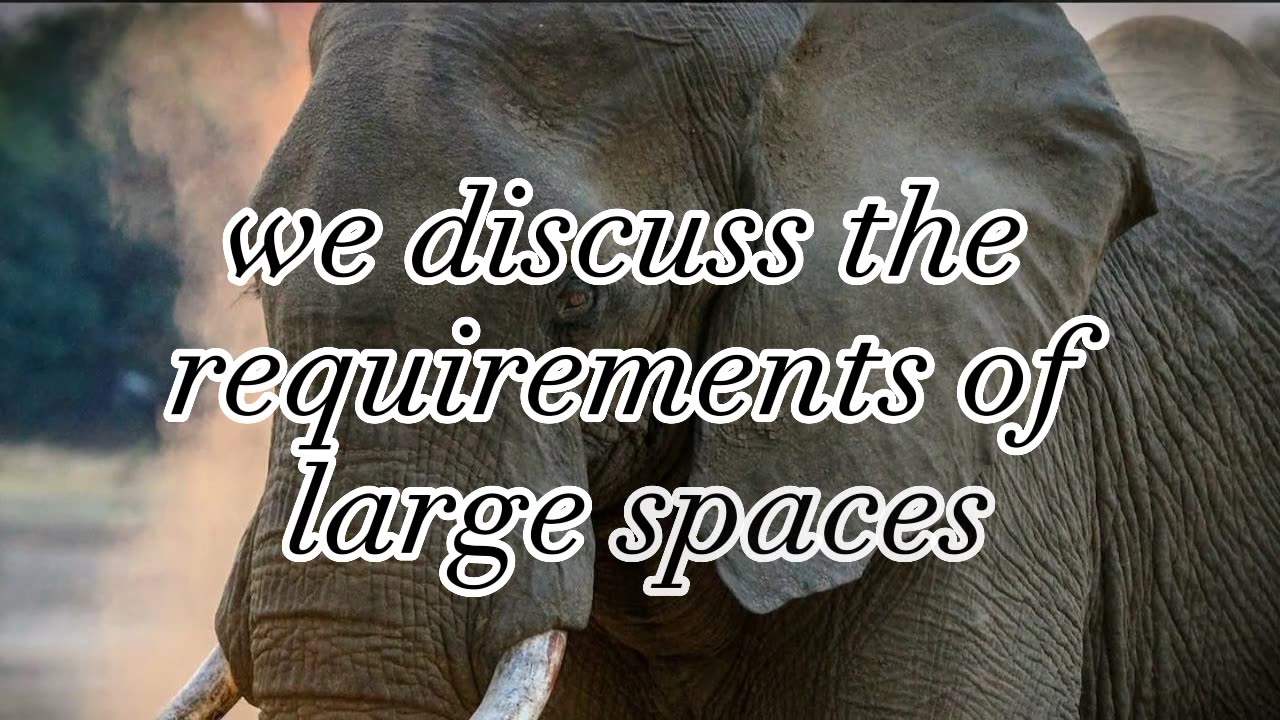Premium Only Content

Guide highlighting animals that are not suitable or safe to keep as pets.
Welcome to our comprehensive guide that focuses on animals that are not suitable or safe to keep as pets. We understand the importance of responsible pet ownership and want to provide valuable information to help potential pet owners make informed decisions.
In this guide, we explore a range of animals that should not be kept as pets due to various reasons. We start by examining primates, such as chimpanzees, gorillas, and monkeys. While these animals may be intelligent and intriguing, their highly social nature, specialized care requirements, and complex needs make them unsuitable for domestic settings. We delve into the potential risks, including aggression, safety concerns, and the physical and psychological distress that primates may experience when kept as pets.
Next, we delve into the topic of large predators, including lions, tigers, cheetahs, and bears. As wild apex predators, these animals have specific dietary, environmental, and space requirements that cannot be adequately met in a home environment. We emphasize the inherent dangers they pose to humans and the importance of observing them from a safe distance in their natural habitats or reputable sanctuaries.
The guide also addresses the unsuitability of keeping venomous snakes, such as cobras or vipers, and certain reptiles like alligators, crocodiles, and large constrictor snakes. We highlight the extreme hazards associated with venomous bites and the specialized care these animals require, including proper enclosures, diet, and expert handling. Their size, strength, and potential danger make them inappropriate choices for most people as pets.
Additionally, we explore the challenges and considerations surrounding exotic large cats like leopards, jaguars, and cougars. These beautiful creatures share similar needs and characteristics with their wild counterparts, necessitating large spaces, specialized diets, and expert handling. Ownership laws are also heavily regulated to address safety concerns associated with these animals.
Lastly, we discuss the incompatibility of owning certain birds of prey, including eagles, hawks, and falcons, as pets. Their natural behaviors and needs are best suited to their wild environments. We shed light on the extensive training, hunting opportunities, and legal restrictions on ownership that exist to protect both the birds and humans.
By providing this guide, we hope to emphasize the importance of responsible pet ownership and ensure the well-being and safety of both animals and humans. It is crucial to conduct thorough research, consult with experts, and understand the specific needs of any potential pet before making a decision.
Welcome to our comprehensive guide that focuses on animals that are not suitable or safe to keep as pets. We understand the importance of responsible pet ownership and want to provide valuable information to help potential pet owners make informed decisions.
In this guide, we explore a range of animals that should not be kept as pets due to various reasons. We start by examining primates, such as chimpanzees, gorillas, and monkeys. While these animals may be intelligent and intriguing, their highly social nature, specialized care requirements, and complex needs make them unsuitable for domestic settings. We delve into the potential risks, including aggression, safety concerns, and the physical and psychological distress that primates may experience when kept as pets.
Next, we delve into the topic of large predators, including lions, tigers, cheetahs, and bears. As wild apex predators, these animals have specific dietary, environmental, and space requirements that cannot be adequately met in a home environment. We emphasize the inherent dangers they pose to humans and the importance of observing them from a safe distance in their natural habitats or reputable sanctuaries.
The guide also addresses the unsuitability of keeping venomous snakes, such as cobras or vipers, and certain reptiles like alligators, crocodiles, and large constrictor snakes. We highlight the extreme hazards associated with venomous bites and the specialized care these animals require, including proper enclosures, diet, and expert handling. Their size, strength, and potential danger make them inappropriate choices for most people as pets.
Additionally, we explore the challenges and considerations surrounding exotic large cats like leopards, jaguars, and cougars. These beautiful creatures share similar needs and characteristics with their wild counterparts, necessitating large spaces, specialized diets, and expert handling. Ownership laws are also heavily regulated to address safety concerns associated with these animals.
Lastly, we discuss the incompatibility of owning certain birds of prey, including eagles, hawks, and falcons, as pets. Their natural behaviors and needs are best suited to their wild environments. We shed light on the extensive training, hunting opportunities, and legal restrictions on ownership that exist to protect both the birds and humans.
By providing this guide, we hope to emphasize the importance of responsible pet ownership and ensure the well-being and safety of both animals and humans. It is crucial to conduct thorough research, consult with experts, and understand the specific needs of any potential pet before making a decision.
Welcome to our comprehensive guide that focuses on animals that are not suitable or safe to keep as pets. We understand the importance of responsible pet ownership and want to provide valuable information to help potential pet owners make informed decisions.
In this guide, we explore a range of animals that should not be kept as pets due to various reasons. We start by examining primates, such as chimpanzees, gorillas, and monkeys. While these animals may be intelligent and intriguing, their highly social nature, specialized care requirements, and complex needs make them unsuitable for domestic settings. We delve into the potential risks, including aggression, safety concerns, and the physical and psychological distress that primates may experience when kept as pets.
Next, we delve into the topic of large predators, including lions, tigers, cheetahs, and bears. As wild apex predators, these animals have specific dietary, environmental, and space requirements that cannot be adequately met in a home environment. We emphasize the inherent dangers they pose to humans and the importance of observing them from a safe distance in their natural habitats or reputable sanctuaries.
The guide also addresses the unsuitability of keeping venomous snakes, such as cobras or vipers, and certain reptiles like alligators, crocodiles, and large constrictor snakes. We highlight the extreme hazards associated with venomous bites and the specialized care these animals require, including proper enclosures, diet, and expert handling. Their size, strength, and potential danger make them inappropriate choices for most people as pets.
Additionally, we explore the challenges and considerations surrounding exotic large cats like leopards, jaguars, and cougars. These beautiful creatures share similar needs and characteristics with their wild counterparts, necessitating large spaces, specialized diets, and expert handling. Ownership laws are also heavily regulated to address safety concerns associated with these animals.
Lastly, we discuss the incompatibility of owning certain birds of prey, including eagles, hawks, and falcons, as pets. Their natural behaviors and needs are best suited to their wild environments. We shed light on the extensive training, hunting opportunities, and legal restrictions on ownership that exist to protect both the birds and humans.
By providing this guide, we hope to emphasize the importance of responsible pet ownership and ensure the well-being and safety of both animals and humans. It is crucial to conduct thorough research, consult with experts, and understand the specific needs of any potential pet before making a decision.
-
 LIVE
LIVE
The White House
2 hours agoPress Conference with the Prime Minister of the United Kingdom of Great Britain and Northern Ireland
799 watching -
 LIVE
LIVE
Barry Cunningham
21 minutes agoBREAKING NEWS: PRESIDENT TRUMP PARTICIPATES IN PRESS CONFERENCE IN ENGLAND
450 watching -
 LIVE
LIVE
Badlands Media
8 hours agoBadlands Daily: September 18, 2025
3,211 watching -
 LIVE
LIVE
JuicyJohns
1 hour ago $0.61 earned🟢#1 REBIRTH PLAYER 10.2+ KD🟢
92 watching -
 LIVE
LIVE
Matt Kohrs
10 hours agoStocks Squeeze To New Highs 🚀🚀🚀 || Live Trading (OPEN, NVDA & TSLA)
640 watching -
 45:23
45:23
Randi Hipper
57 minutes agoBITCOIN PRICE MOMENTUM PICKS UP! CRITICAL LEVELS TO WATCH
4.72K -
 11:33
11:33
Mrgunsngear
13 hours ago $4.03 earnedBreaking: This NFA Exempt Firearm Is Now Available With No Stamp - This Is HUGE 🇺🇸
8.3K17 -
 LIVE
LIVE
The Mike Schwartz Show
2 hours agoTHE MIKE SCHWARTZ SHOW with DR. MICHAEL J SCHWARTZ 09-18-2025
2,609 watching -
 LIVE
LIVE
Wendy Bell Radio
5 hours agoGood Night, Jimmy
7,894 watching -
 LIVE
LIVE
LFA TV
12 hours agoKIMMEL GONE | ANTIFA LABELED TERRORISTS! - THURSDAY 9/18/25
3,627 watching